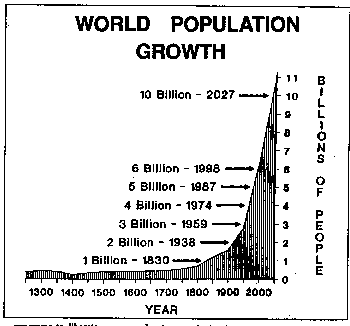
In recent years, global food production has dramatically increased, due to new crop hybrids, better crop management techniques, use of fertilizers and insecticides, and the clearing of forests to make more agricultural land. However, these methods of increasing food production have now reached their limit, whereas the human population continues to grow at an even faster rate. In its annual "State of the World" report January, 1994, the Worldwatch Institute reported that the world's food supply is no longer keeping up with population increases, and presently about one billion people are malnourished. In other words, in terms of food, we have reached the earth's carrying capacity. In terms of energy, we've already exceeded it: we're burning energy reserves faster than new ones are being discovered underground or produced in the biomass. Modern technology has accelerated the rate at which people in "developed countries" consume energy.
If everyone in the world ate a 30% meat diet, as we do in the U.S., the world could support 2.6 billion people. If everyone was vegetarian the world could adequately feed about 5.5 billion people-the present population is 5.6 billion. Thus, the reason about one billion people are currently malnourished is primarily due to the fact that some of us are omnivorous. But make no mistake: even if we all become vegetarians (which would be better for our health), we must still stop population growth. In spite of the fact that half-a-million people are dying of AIDS a year, the earth is gaining 97 million people a year. It took millions of years for the earth to reach the first one billion people in 1830. Then it took another 100 years, until 1930, to reach two billion. The third billion was added in only 30 years, by 1960. In another 15 years (by 1975) we added a fourth billion.After another 12 years, in 1987, the world's population passed 5 billion. Clearly this growth cannot continue. We must initiate massive programs to liberate women, educate people that smaller families are better, and make family planning accessible to everyone. The alternative is mass starvation and warfare.
One of the most serious consequences of overpopulastion is deforestation. Forested land provides very little food compared to agricvultural lanas. Thus, forests are cleared as population expands. Forest soils absorb water during heavy rainfalls, which reduces flooding and loss of topsoil, and forests release water during periods of low rainfall, thus preventing the streams from drying up. Furthermore, forests provide a wilderness where people can be spiritually renewed by experiencing what nature is like on land where humans are only an occasional visitor.
A country which provides an example of what happens when education and family planning are not widely availabnle is Haiti. The population there has become so concentrated that all the hardwood forests that greeted Columbus have been cut down. Many farms are now so small , or the soil so depleted, that amany farmers cannot grow enough food to feed their own families. The coastal waters have been fished out: people who used to make a living at fishing can't catch enough to feed their own families. This kind of situation will increase worldwide if we don't attack the root cause: Overpopulation.
George D Webb is chair of the Population Committee of the Vermont (U.S..A.) Sierra Club
